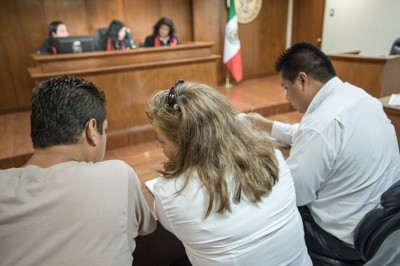In 2008, the Government of Mexico approved a constitutional reform mandating the nation-wide adoption of a new oral adversarial criminal justice system. It seeks to improve the transparency, effectiveness, and efficiency of criminal justice proceedings while protecting due process, promoting assistance to crime victims, and strengthening human rights.

Under the Merida Initiative, a strategy for regional security cooperation between Mexico and the United States, USAID’s current rule of law assistance supports the Government of Mexico, civil society, and other legal institutions to transition from an inquisitorial system to the new oral adversarial criminal justice system.
USAID supports Mexican efforts to make the reforms operational in the 31 states and Federal District by June 2016. USAID coordinates closely with the U.S. Department of Justice, which provides similar assistance to the Mexican Government. The Mexican Technical Secretariat for Justice Sector Reform (SETEC by its Spanish acronym) is the primary partner and has the constitutional mandate to coordinate justice sector reforms nationwide.
Key Achievements
- In the states where USAID has the longest history of providing support, pre-trial detention rates have decreased substantially, in some states by more than 25 percent.
- Over 30,000 justice sector operators, within the new criminal justice system, have benefitted from USAID activities, both through direct training programs and institutional support to training units.
- The use of alternative mechanisms for non-violent or unintentional misdemeanors in those states operating under the reforms, which USAID has supported, has resulted in more than double the attention and resources available for violent crimes, while reducing the administrative burden and incarceration rates for non-violent crime.
- In a recent study of the implementation of justice sector reform in states long-supported by USAID, 100 percent of observed hearings were attended by judges, prosecutors, and defense attorneys, while under the old system the judge was not present at the initial hearings 70 percent of the time.
- USAID supports change in legal education curricula and methodology and continues to support a growing consensus to regulate the legal profession, including unprecedented assistance to the Mexican Senate for three days of public hearings promoting certification and regulation of the legal profession.
Rule of Law Fact Sheet (Jan2016) [PDF, 173K]








Comment
Make a general inquiry or suggest an improvement.